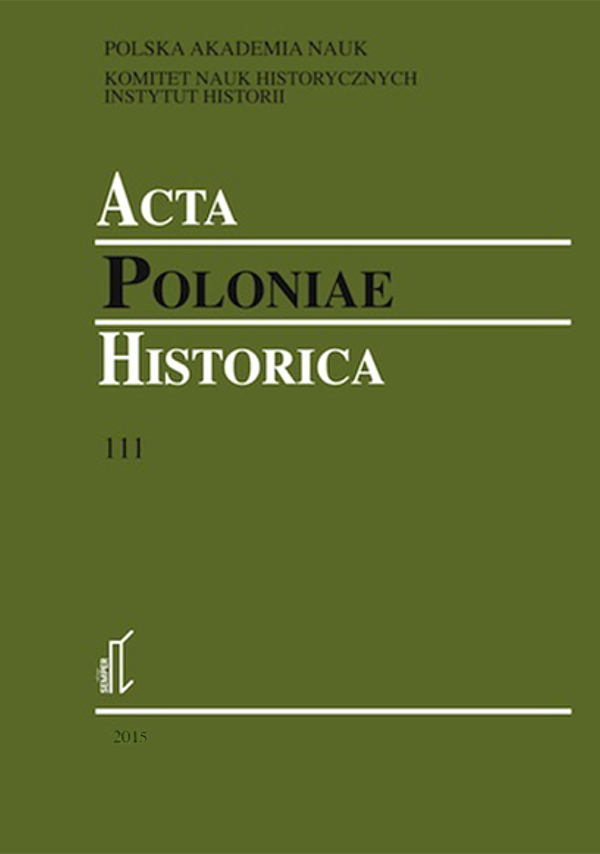‘Multiple Sonderwegs.’ The Specificity of Historical Development of East Central Europe in the Nineteenth and Twentieth Century (Introductory Remarks)
DOI :
https://doi.org/10.12775/APH.2015.111.01Mots-clés
modernization, development, East Central Europe, protochronism, methodologyRésumé
This introductory article offers intellectual frames and historical context to the subsequent collection of essays. There are two questions their authors try and answer: First, what discussions on the respective specificities of historical development were carried out in various countries of East Central Europe in the nineteenth and twentieth century. Second, what was the scope of topics to be discussed, whereas their aim is to interweave this description or analysis of the debates with posing the question regarding the core of the matter – and this by showing a series of case studies where the approach connected, in some way or another, with the peculiar path concept might seem useful. For the purpose of this volume, the notion of peculiar path is approached in a possibly broad context. The structure of the nineteenth-century city, formation of a modern national awareness: such problems are suitable, according to the authors, for research in view of multiplicity of peculiar paths: rather than highways along which the Zeitgeist of a nation or humanity streaks, these would be medium-rank and medium-sized roads on which medium-scale processes and occurrences roll along.Références
Bibó István, Misère des petits États d’Europe de l’Est, trans. György Kassai (Paris, 1932).
Blackbourn David and Eley Geoff, The Peculiarities of German History: Bourgeois Society and Politics in Nineteenth-Century Germany (Oxford, 1984).
Boia Lucian, History and Myth in Romanian Consciousness (Budapest, 2001).
Dénes Iván Zoltán, Eltorzult magyar alkat. Bibó István vitája Németh Lászlóval és Szekfű Gyulával (Budapest, 1999).
Dénes Iván Zoltán, Európai mintakövetés – Nemzeti öncélúság. Értékvilág és identi¬táskeresés a 19–20. századi Magyarországon (Budapest, 2001).
Eisenstadt Shmuel N. , ‘Multiple Modernities’, Daedalus, cxxix, 1: Multiple Moder¬nities (Winter, 2000).
Erős Vilmos, A Szekfű-Mályusz vita (Debrecen, 2000).
Gerschenkron Alexander, Economic Backwardness in Historical Perspective: A Book of Essays (Cambridge, Mass., 1962).
Górny Maciej, Wielka Wojna profesorów. Nauki o człowieku (1912–1923) (Warsaw, 2014).
Jedlicki Jerzy, A Suburb of Europe. Nineteenth-Century Polish Approaches to Western Civilization (Budapest, 1999).
Jurczak Kazimierz, Dylematy zmiany. Pisarze rumuńscy XIX wieku wobec ideologii zachowawczej (Cracow, 2011).
Lipset Seymour M., American Exceptionalism: A Double-Edged Sword (New York and London, 1997).
Marek Jaroslav and Kutnar František, Přehledné dějiny českého a slovenského dějepi¬sectví (Prague, 2009).
Orłowski Hubert (ed.), Sonderweg. Spory o ‘niemiecką drogę odrębną’, trans.Jerzy Kałążny (Poznan, 2008).
Rapport Mike, 1848: Year of Revolution (New York, 2009).
Stahl Henri H., Traditional Romanian Village Communities: The Transformation from the Communal to the Capitalist Mode of Production in the Danube Region, trans.Daniel Chirot and Holley Coulter Chirot (Cambridge and Paris, 2008).
Szacki Jerzy, Historia myśli socjologicznej (Warsaw, 19831).
Szwat-Gyłybowa Grażyna, Haeresis Bulgarica w bułgarskiej świadomości kulturowej XIX i XX wieku (Warsaw, 2005).
Todorova Maria N., Imagining the Balkans (Oxford and New York, 2009).
Trencsényi Balázs, The Politics of “National Character”: A Study in Interwar East European Thought (London and New York, 2012).
Wierzbicki Andrzej, Poczet historyków polskich. Historiografia polska doby podzabo¬rowej (Poznan, 2014).
Wolff Larry, Inventing Eastern Europe: The Map of Civilization on the Mind of the Enlightenment (Stanford, 1994).
Téléchargements
Publiée
Comment citer
Numéro
Rubrique
Licence
Title, logo and layout of journal are reserved trademarks of APH.Stats
Number of views and downloads: 556
Number of citations: 3



